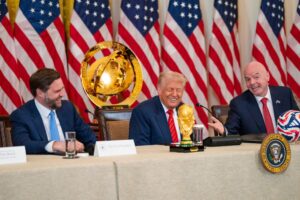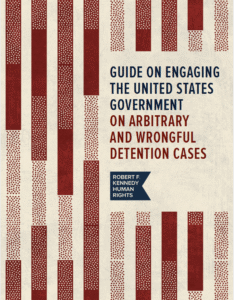May 3, 2018
The Honorable Michael Pompeo
Secretary of State
U.S. Department of State
2201 C Street, NW
Washington, DC 20520
Dear Secretary Pompeo,
We are writing to bring to your attention several extremely problematic sections of the recently released Western Sahara 2017 Human Rights Report. As you know, the State Department’s annual human rights reports are “used by the U.S. government, lawmakers, and researchers around the world as a global benchmark for how each country treats human rights.”1 They are parsed closely by countries and advocates on the ground, making it critical that the reports are completely accurate, both in their presentation of facts, and in their characterization of U.S. foreign policy. Unfortunately, the Western Sahara report this year does not meet this standard. We call on you to make the needed corrections.
Robert F. Kennedy Human Rights has been working specifically on human rights issues resulting from the Moroccan occupation of Western Sahara for a decade. In 2008, Robert F. Kennedy Human Rights presented Aminatou Haidar with its annual Robert F. Kennedy Human Rights Award for her steadfast peaceful advocacy for the rights of the Sahrawi people. Ms. Haidar has remained one of the most active human rights defenders in Western Sahara despite her arrest, enforced disappearance, four-year confinement, and torture by Moroccan security forces. She leads the Collective of Sahrawi Human Rights Defenders (CODESA), one of the most important independent human rights organizations working on the ground in Western Sahara.
A paragraph that is emblematic of the failure to accurately portray both facts and U.S. foreign policy in relates specifically to Ms. Haidar. The paragraph states:
On June 20, Sahrawi activist and president of the unregistered NGO Collective of Defenders of Human Rights (CODESA) Aminatou Haidar organized a public
commemoration, with Moroccan authorities’ permission, of the 2016 death of POLISARIO leader Mohamed Abdelaziz. The event, which took place in an open-air tent and included public display of separatist Sahrawi Arab Democratic Republic flags as well as a banner describing the location as “occupied Laayoune,”proceeded without intervention from authorities.
First—as an indication of the inattention to factual detail typical of this report—the name of Ms. Haidar’s organization is incorrect. A review of previous years’ human rights reports would show that the organization is the Collection of Sahrawi Human Rights Defenders. But much more damaging, the substance of the factual summary of the event described is inaccurate. Ms. Haidar attended an event on June 20 to commemorate the death of Mohamed Abdelaziz, but it did not take place with the permission of Moroccan authorities, nor was it organized by her or by CODESA. It also did not proceed “without intervention.” The event was surrounded by security forces from the outset, and their manner and positioning was clearly intended to intimidate participants. While thankfully no violent suppression took place, that is by no means the standard for concluding that the security forces did not intervene. Surrounding a peaceful event is most certainly an intervention, and Ms. Haidar should have been consulted before finalizing the report.
This paragraph also demonstrates the mischaracterization of U.S. foreign policy that exists throughout this report. The paragraph refers to the Sahrawi Arab Democratic Republic as “separatist.” Yet the United States (like every other country in the world) does not recognize Morocco’s sovereignty over Western Sahara. The United States cannot characterize a movement as seeking to separate Western Sahara from Morocco because the United States does not recognize Western Sahara as part of Morocco. Instead, Western Sahara is characterized by the United Nations as a Non-Self-Governing Territory (a colony), and the Sahrawi Arab Democratic Republic is not a separatist organization, but the internationally-recognized representative of the Sahrawi people as they seek their right to self-determination in accordance with international law.
This inaccurate portrayal of facts and policy did not go unnoticed. Morocco World News trumpeted this paragraph specifically as vindicating the Moroccan version of the event and heralding the State Department’s labeling of the Sahrawi Arab Democratic Republic as “separatist.”2
The paragraph discussed above is just one example of inaccurate facts and mischaracterizations of U.S. foreign policy that proliferate this report. But the report is also striking for what it omits. There is no mention that Morocco underwent its third cycle of Universal Periodic Review at the United Nations Human Rights Council in May 2017. This is despite the fact that the United States made three recommendations to Morocco that were directly on point about ending the targeting and detention of journalists and others exercising their rights to freedom of expression, peaceful assembly and association; approving license applications for all non-governmental associations; and conducting investigations into all allegations of security force abuses.3 In his letter to the Moroccan government about the outcomes of the Universal Periodic Review, the High Commissioner for Human Rights explicitly expressed concern for human rights defenders and organizations working on Western Sahara.4 This would seem relevant information to include.
The factual inaccuracies and the misrepresentation of U.S. foreign policy are incredibly problematic. When coupled with glaring omissions, it is clear that the report does not live up to the standard that has become characteristic of the State Department human rights reports, as a detailed and accurate portrayal of the human rights situation in a particular country. We call on you to review the Western Sahara report and make the needed corrections, so that it again lives up to this worthy standard.
Sincerely,
Kerry Kennedy
President
Robert F. Kennedy Human Rights
Aminatou Haidar
President President
Collective of Sahrawi Human Rights Defenders (CODESA)
CC: Ms. Stephanie Miley
Chargé d’Affaires
United States Mission to Morocco
1 Robbie Gramer, Human Rights Group Bristling at State Department Report, FOREIGN POLICY (Apr. 21, 2018), http://foreignpolicy.com/2018/04/21/human-rights-groups-bristling-at-state-human-rights-report/.
2 Safaa Kasraoui, US State Department Labels Polisario ‘Separatists’ in 2017 Human Rights Report, MOROCCO WORLD NEWS (Apr. 23, 2018), https://www.moroccoworldnews.com/2018/04/244972/us-state-dept-labels-polisarioseparatists-in-2017-human-rights-report/.
3 Human Rights Council, Report of the Working Group on the Universal Periodic Review: Morocco (July 13, 2017), https://documents-dds-ny.un.org/doc/UNDOC/GEN/G17/190/71/PDF/G1719071.pdf?OpenElement.
4 Letter from the High Commission for Human Rights to the Foreign Minister of Morocco (October 23, 2017), http://lib.ohchr.org/HRBodies/…




